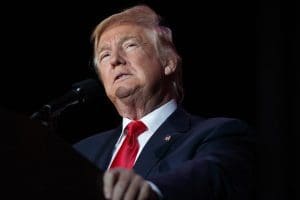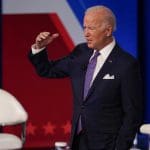Trump's refusal to acknowledge Russian interference is "deeply damaging to the country" and raises "the specter of treason"
During an interview on ABC’s This Week, Rep. Adam Schiff explained why the Obama administration is being circumspect in its public response to Russian interference in the U.S. election, and then made clear the steep cost of Donald Trump’s reckless refusal to condemn the interference: .@RepAdamSchiff: For Trump “to continue to give the Russians deniability […]

During an interview on ABC’s This Week, Rep. Adam Schiff explained why the Obama administration is being circumspect in its public response to Russian interference in the U.S. election, and then made clear the steep cost of Donald Trump’s reckless refusal to condemn the interference:
.@RepAdamSchiff: For Trump “to continue to give the Russians deniability is deeply damaging to the country.” https://t.co/7L3nZJqSf8
— ABC News Politics (@ABCPolitics) December 18, 2016
We have good sources of information; we don’t want to disclose those. I’m sure the Russians would love to know the source of information, so they can take counter-measures to prevent us from being able to attribute other Russian malignant cyberactivity in the future. And the administration shouldn’t disclose that.
And ultimately this is why I think what the President-elect is doing is so damaging — because by attacking the intelligence community, basically it’s going to make it that much more difficult for the current President to make attribution, for the American people to understand what they really need to about Russian involvement in our elections.
This was unprecedented. And for the President-elect to continue to give the Russians deniability is deeply damaging to the country.
Trump has called the intelligence assessments “ridiculous” and has said he will simply replace the intelligence community with “his own people,” even as there is mounting evidence that Trump himself had direct knowledge of the interference, possibly even before the U.S. intelligence community disclosure.
This breathtaking posture, which continues to raise concerns about Trump’s ties to Russia, is further being audaciously mischaracterized by Trump’s incoming Chief of Staff Reince Priebus as an abundance of caution.
President-elect Donald Trump isn’t ready to accept the reported conclusion that Russia sought to intervene in the U.S. presidential election, Trump’s incoming White House chief of staff said Sunday.
“I think he would accept the conclusion if these intelligence professionals would get together, put out a report and show the American people they’re actually on the same page as opposed to third parties through the Washington Post,” Priebus said on Fox News Sunday. “We haven’t heard from Comey. … I think that these guys should be straight with the American people and come out and say it. I don’t think they’re been clear about it.”
This is manifestly absurd. At the last press conference he gave — in July, months before the intelligence community alerted the parties about hacking — Trump invited the Russians to hack the State Department: “Russia, if you’re listening, I hope you’re able to find the 30,000 e-mails that are missing. I think you will probably be rewarded mightily by our press.”
Incredibly, after he publicly invited Russian hacking to harm his opponent, Trump is now claiming he is not ready to “accept the conclusion” that Russian hacking interfered in the election to influence its outcome.
This claim beggars belief.
The position is so clearly, as Schiff noted, “deeply damaging to the country” that John Shattuck, a former assistant secretary of state for democracy, human rights, and labor, writes in the Boston Globe: “A specter of treason hovers over Donald Trump.”
There are several possible explanations for Trump’s position. They are not mutually exclusive.
First, he may be trying to shore up his political standing before the Electoral College vote on Monday.
Second, he may be attempting to undermine the credibility of US intelligence agencies in advance of his taking office so that he can intimidate them and have a freer hand in reshaping the intelligence product to suit his objectives.
Third, he may be testing his ability to go over the heads of intelligence professionals and congressional critics and persuade the American public to follow his version of the truth about national security threats. And finally, he may be seeking to cover up evidence of involvement or prior knowledge by members of his campaign team or himself in the Russian cyberattack.
In each case the president-elect is inviting an interpretation that his behavior is treasonous.
This is a serious charge, and, given the preponderance of the evidence at this point, one that is absolutely warranted.
Recommended

Biden campaign launches new ad focused on Affordable Care Act
Former President Trump has said he wants to do away with the popular health care law.
By Kim Lyons, Pennsylvania Capital-Star - May 08, 2024
Trump leaves door open to banning medication abortion nationwide
Donald Trump is planning to release more details in the weeks ahead about how his administration would regulate access to medication abortion, according to comments he made during a lengthy interview with Time magazine published Tuesday.
By Jennifer Shutt, States Newsroom - April 30, 2024
Biden on abortion rights: President expects to give speech Tuesday on new Florida 6-week ban
‘Having the president of the United States speaking out loud and with confidence about abortion access is a great thing’
By Mitch Perry, Florida Phoenix - April 22, 2024












































































